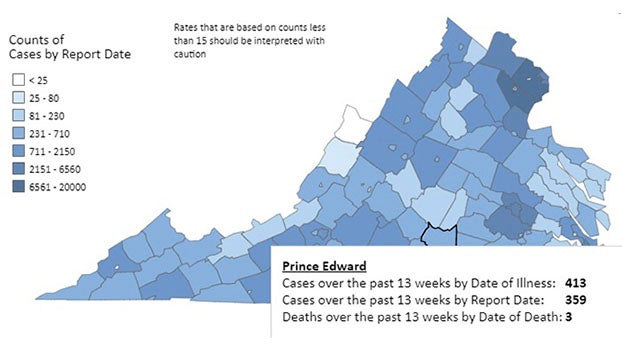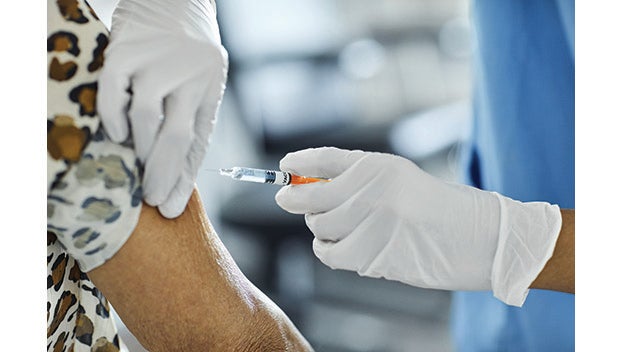Mecklenburg leads state in key COVID-19 stat
Published 6:00 am Wednesday, April 15, 2020
|
Getting your Trinity Audio player ready...
|
One of Charlotte County’s nextdoor neighbors, Mecklenburg County, has more cases of coronavirus, per capita, than any other locality in Virginia.
Southside Health District Director Dr. Scott Spillmann noted Tuesday morning that the district, which includes Mecklenburg, Brunswick and Halifax, had 73 cases of the novel coronavirus and one death. The Virginia Department of Health website confirmed 57 of those cases were in Mecklenburg County. That’s compared to nearby Charlotte County which currently has only four cases of COVID-19.
Spillmann said he could not say how many of Mecklenburg’s 57 cases were in long-term care facilities, but Sentara noted several cases originated there. Spillman told The Gazette-Virginian last week that 13 people at MeadowView Terrace had tested positive with more test results pending.
Sentara confirmed in a recent press release that at Sentara MeadowView Terrace, a Clarksville rehabilitation and long-term care facility, several residents have tested positive for COVID-19.
“Out of an abundance of caution, and to keep everyone in the facility safe, we have decided to transport and temporarily relocate the residents affected to a dedicated isolation unit at Sentara Halifax Regional Hospital,” Sentara officials said in the release. “This removes the potential for additional exposure at Sentara MeadowView Terrace and ensures our medical team can respond quickly should any of those residents need additional medical care.”
Officials added that due to this development, all residents and staff at MeadowView Terrace were being tested for COVID-19.
“Those test kits are being processed in our dedicated COVID-19 laboratory at Sentara Norfolk General Hospital,” officials said in the release, noting they expected those lab results to be returned by April 9.
In Sentara’s most recent statement as of Tuesday morning, April 14, officials stated they will not be providing a daily update on testing or outcomes.
“We will continue to closely monitor all residents and staff affected by this exposure and use all appropriate means to prevent any additional spread,” officials added in the statement.
The statement opened by noting that Sentara MeadowView Terrace is working with the Virginia Department of Health to ensure the safety of residents and staff.
“We continue to employ CDC-approved best practices, including restrictions on visitors, social distancing, frequent hand washing and appropriate use of (personal protective equipment) by staff,” Sentara officials said in the statement.
In the initial release, officials noted they were asking all family members not to visit Sentara MeadowView Terrace or Sentara Halifax Regional Hospital at this time.
“Please stay in touch with your loved ones by phone or other electronic means,” officials said in the release. “We will update our staff and resident families when we know more about the results of the testing now being done. Once we are confident that there is no risk of exposure, residents will be transferred back to Sentara MeadowView Terrace.”
In the more recent statement, Sentara officials gave more insight into the efforts to disinfect the MeadowView Terrace facility.
“We are thoroughly cleaning all areas of the facility and have brought in a robotic ultraviolet disinfecting device used to sterilize hospital operating rooms to help us ensure a safe environment,” officials said in the statement.
Spillmann said he could not speak with specificity about MeadowView Terrace, but his explanation of what the health district promotes to help protect against the spread of COVID-19 illustrated that the staff of the long-term care facility is doing what it needs to do.
“I can tell you that we advocate in any facility, as well as in homes, the social distancing as much as possible, the strict hygiene, cleaning, all the different things,” he said.
Spillmann’s insights into why long-term care facilities might end up having groups of COVID-19 cases helped underscore the great importance of following through on the measures to prevent the virus’ spread.
“People in nursing homes, various longterm care facilities of one type or another, are particularly vulnerable,” he said. “As you get older your immune system doesn’t function as well as it did when you were 20, and then one of the parts about getting older is you acquire other health problems. So those people in any of the long-term care facilities are just inherently more vulnerable, and most of the facilities I’m aware of are taking measures to — and have already taken measures — to minimize risk.”




